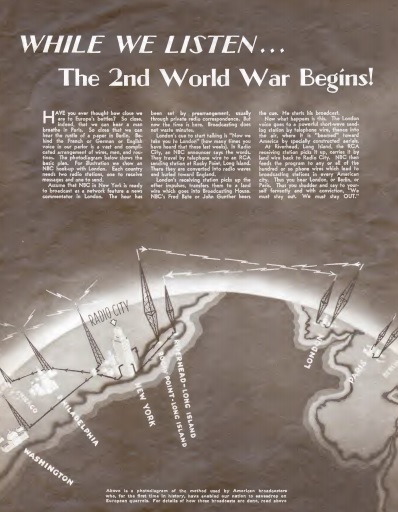Gertrude Belville is shown here in the November, 1924, issue of Radio Age tuning this giant radio set at the New York Radio World’s Fair. She reports that the volume of the set could be heard for miles around.

Gertrude Belville is shown here in the November, 1924, issue of Radio Age tuning this giant radio set at the New York Radio World’s Fair. She reports that the volume of the set could be heard for miles around.
 Seventy-five years ago, American radio listeners were frequently hearing the phrases, “we take you to London,” “we take you to Paris,” and “we take you to Berlin,” as Americans learned how close they were to Europe’s troubles. As this item from Radio Guide for the week ending September 29, 1939, points out, we were close enough to hear a man breathe in Paris or the rustle of a paper in Berlin.
Seventy-five years ago, American radio listeners were frequently hearing the phrases, “we take you to London,” “we take you to Paris,” and “we take you to Berlin,” as Americans learned how close they were to Europe’s troubles. As this item from Radio Guide for the week ending September 29, 1939, points out, we were close enough to hear a man breathe in Paris or the rustle of a paper in Berlin.
The diagram shows the example of how NBC would connect to its correspondents in London, Fred Bate or John Gunther. From NBC’s New York studios, the cue would go via telephone to the RCA short wave transmitter at Rocky Point, Long Island. The signal would be picked up by an English receiving station and sent by telephone to Broadcasting House in London. The English broadcast would go by telephone to the English short wave transmitter and picked up by the RCA receiving station at Riverhead, Long Island. From there, the signal would go back to NBC’s Radio City studios for retransmission to the network.
The process concludes when the American listener picks up the broadcase and says to himself “fervently and with conviction,” and alas, in vain, “We must stay out. We must stay OUT.”
A hundred years ago, the September 1914 issue of Boys’ Life included these plans for constructing a box kite which would release a parachute. After the kite was aloft, a small runner was released and was blown up the string by the wind. When it got to the top, the parachute would release.
A hundred years ago today, German zeppelins bombed Paris, Warsaw, and other cities. The map above, from the September 28, 1914 issue of the New York Sun, shows the locations of the Paris bombs, near the Eiffel Tower. In Paris, three were killed by bombs, one of which landed at a spot the American ambassador had passed only minutes earlier.
In Calais, bombs were dropped but failed to explode. And the Poles managed to shoot down the zeppelin bombing Warsaw, taking the crew prisoners.
See also: Fall of Paris, 1940
If you’re looking for gift ideas with a postal theme, please check out the selection of Mr. Zip gifts.
We recently read about a troupe of acting bears that visited Indianapolis 150 years ago. Another working bear made the news 100 years ago today, but not as an actor. “Boss,” a bear native to the woods of Maine, made the pages of the Philadelphia Evening Ledger on September 26, 1914. Boss worked as a night watchman in a Pennsylvania distillery. The photograph on the left illustrates his method for treeing an intruder. There is also an artist’s conception of Boss (left) apprehending a suspect (right).
In the 1960’s, most self-respecting American homes would boast a console stereo in a prominent spot in the living room. The position would be second in honor only to that of the television.
And fifty years ago today, September 25, 1964, Life Magazine carried this ad from Admiral featuring this handsome unit. The Danish modern lowboy cabinet, made of genuine walnut veneers and hardwoods, contained an all solid state stereo featuring tuner and phonograph.
The humble binder clip celebrates its 100th birthday this month. This new innovation is shown here in the September 1914 issue of Popular Mechanics.
Radio was coming to the fore as a method of communication during the great war, but the tried and true methods of the past were still being used. A hundred years ago today, the Philadelphia Evening Public Ledger for September 23, 1914, shows a carrier pigeon, which the paper notes were being used with great success by the Belgian Signal Corps. This bird is shown before its release containing a coded message. The french words bois (woods), pont (bridge) and cole (mine) are included in plain text.
In other war news, the paper reports that 31,200 Canadian troops, along with 7500 horses would be sent to Europe within the week, to be sent to the front immediately. In addition, the Canadians planned to recruit 19,000 more men who would be sent to the front before November.
A hundred years ago, owning a phonograph was a reasonably priced proposition. This ad, from the September 10, 1914 edition of the New York World, advertises that you can purchase a $15 Victrola, along with $9 worth of records, for only a dollar down and 50 cents per week.
Today, you can listen to most of those records online, since the Library of Congress National Jukebox has them available for download or online listening. The audio quality today, as it was a century ago, is surprisingly good, and much better than most people expect.